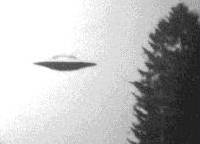Article/Document:
The truth is out there: that's a scientific fact
The Sunday Herald (Scotland), 2002
original source | fair use notice
Summary: Aliens have never had it so good. Their friends the Raelians are claiming to have cloned humans; their PR agent on earth, Steven Spielberg, has just unveiled a new TV mini-series, Taken; and now science is starting to take them seriously. An interest in the existence of cosmic neighbours is no longer the preserve of shadowy conspiracy theorists or sci-fi obsessives: respectable academics are now in on the act.
As Steven Spielberg's new alien drama hits the screen, Edd McCracken meets the scientists who've begun to believe
ALIENS have never had it so good. Their friends the Raelians are claiming to have cloned humans; their PR agent on earth, Steven Spielberg, has just unveiled a new TV mini-series, Taken; and now science is starting to take them seriously. An interest in the existence of cosmic neighbours is no longer the preserve of shadowy conspiracy theorists or sci-fi obsessives: respectable academics are now in on the act.
But can the previously disparate worlds of cold logic and extraterrestrial speculation really cohabit? 'I think they make more comfortable bedfellows than they used to,' says Professor Ian Stewart, director of Warwick University's Mathematics Awareness Centre. 'And I'm not the only person who thinks this.'
Stewart, who is the co-author of a book called Evolving The Alien: The Science Of Extraterrestrial Life, is part of a growing shift in academia . Nature, the world's leading scientific journal, essentially gave its blessing to astrobiology -- rational speculation as to what aliens look like -- when it included a supplement on the subject last year; and Nasa has taken to consulting science-fiction writers such as Gregory Benford and Greg Bear when planning missions.
Stewart says it is misguided to dismiss the notion of intelligent extraterrestrial life. 'It would be a very surprising universe if we were the only intelligent creatures,' he says. 'Aliens ought to exist. They are out there.'
Yet he is keeping his feet firmly on rational ground. One thing he does not believe is that aliens are visiting us now. 'We are very sceptical,' he says. 'We don't think people who claim to have seen aliens are telling lies, but scientifically the claims seem highly implausible. There are many ways the human mind can fool itself.'
Professor Christopher French of the University of London, an expert in the psychology of the paranormal, agrees. 'Academic psychology has ignored these kinds of experiences, which I think is a mistake,' he says. He has rationalised supposed UFO sightings and alien abductions by outlining the main psychological explanations -- the most common of which is sleep paralysis. 'This is a situation between sleep and wakefulness when you suddenly realise you can't move,' he explains. It is often associated with hallucinations -- which could explain why people claim to have seen aliens in their bedrooms -- and a strong sense of a harmful, evil presence. It is estimated that 40% of the population has experienced this.
French also rubbishes hypnotic regression, which has provided some vivid accounts of alien abductions. 'It actually provides a context where people produce a kind of account based on fantasy and then believe it with total conviction,' he points out.
But he is keeping an open mind, and believes that studying the psychology of those who believe they have been abducted will reap academic rewards. 'There are really only two possibilities,' he says. 'Either some of the sightings do reflect extraterrestrial intelligence -- which, if it were the case, would be the scientific breakthrough of the millennium -- or they can tell us more about human psychology. Either way, we can't lose by studying them.'
Billy Buchanan is a councillor for Bonnybridge, the Stirlingshire town that has become Britain's UFO-sightings capital. He says he has noticed a shift in scientific perception. 'They're taking it more seriously,' he says, 'rather than saying, 'What a load of rubbish, you're all drunk up there.'
'But,' he adds conspiratorially, 'whoever says anything to the masses is being orchestrated to say it. They say Steven Spielberg was given millions of dollars by the US government to make films like ET. Maybe it's a way of making people aware that some day ET is going to chap your own door. It's like an induction.'
Read more articles on this topic:






